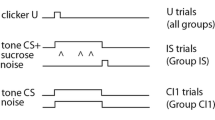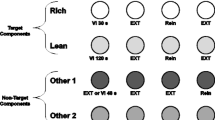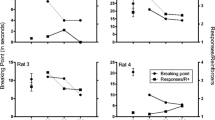Abstract
Previous research has demonstrated that rats will increase their rates of lever pressing for sucrose rewards in the first half of an experimental session when food pellets, rather than the same sucrose, continually serve as the reward in the second half of the session. This effect has been coined induction, and the present study investigated whether it could be altered by altering "motivational" variables. Experiment 1 manipulated subjects' motivation by altering, across conditions, their level of food deprivation. Predictably, the size of induction varied directly with level of deprivation. Experiments 2 and 3 manipulated subjects' motivation by feeding them food pellets and sucrose, respectively, prior to their responding in the experimental session. These pre-session feedings decreased the size of the observed induction in both experiments. The results from the present study indicate that the size of induction is correlated with subjects' motivation to respond for the available reinforcers. They are also consistent with the idea that operant processes underlie the effect. The notion that induction might encompass the concept of "anticipation" is also discussed.



Similar content being viewed by others
Notes
Finding changes in response rates within sessions during the 1%–1% conditions can be considered normal, if not expected, given the body of research on within-session changes in operant responding (e.g., McSweeney and Roll 1993). As can be seen in Fig. 1, the changes in response rates during the 1%–1% were small and took the form of either an increase followed by a decrease in responding, or simply a decrease in responding across the session. Such results are consistent with previous research that has studied rats lever pressing for low-concentration sucrose reinforcers (Melville et al. 1997; experiment 2).
References
Anderson JR (1995) Cognitive psychology and its implications, 4th edn. Freeman, New York
Aoyama K (2000) Effects of hunger state on within-session response decreases under CRF schedule. Learn Motiv 31:1–20
DeMarse TB, Killeen PR, Baker D (1999) Satiation, capacity, and within-session responding. J Exp Anal Behav 72:407–423
Flaherty CF (1996) Incentive relativity. Cambridge University Press, Cambridge
Flaherty CF, Checke S (1982) Anticipation of incentive gain. Anim Learn Behav 10:177–182
King BM, Brandt AE, Weatherly JN (2002) Up or down: the influence of upcoming reinforcement on consummatory and operant behavior. J Gen Psychol 129:443–461
McSweeney FK, Roll JM (1993) Responding changes systematically within sessions during conditioning procedures. J Exp Anal Behav 60:621–640
Melville CL, Rue HC, Rybiski LR, Weatherly JN (1997) Altering reinforcer variety or intensity changes the within-session decrease in responding. Learn Motiv 28:609–621
National Research Council (1996) Guide for the care and use of laboratory animals. National Academy of Sciences, Washington, D.C.
Reynolds GS (1961) Behavioral contrast. J Exp Anal Behav 4:57–71
Roll JM, McSweeney FK, Johnson KS, Weatherly JN (1995) Satiety contributes little to within-session decreases in responding. Learn Motiv 26:323–341
Skinner BF (1938) The behavior of organisms. Appleton-Century-Crofts, New York
Weatherly JN, Moulton PL (2001) The effect of food-pellet reinforcement on rats' rates of lever pressing for 1% sucrose reinforcers across several "contrast" procedures. Learn Motiv 32:193–218
Weatherly JN, Stout JE, McMurry AS, Rue HC, Melville CL (1999) Within-session responding when different reinforcers are delivered in each half of the session. Behav Process 46:227–243
Weatherly JN, Davis CS, Melville CL (2000) Induction with upcoming food-pellet reinforcement. Learn Motiv 31:180–199
Weatherly JN, Himle MB, Plumm KM, Moulton PL (2001) Three tests of 'anticipatory responding' as an account for induction produced by upcoming food-pellet reinforcement. Behav Process 56:49–66
Weatherly JN, King BM, Arthur EIL (2002a) Rats lever pressing for 1% sucrose and food-pellet reinforcement: in search of negative behavioral contrast. Psychol Rec 52:507–529
Weatherly JN, Plumm KM, Smith JR, Roberts WA (2002b) On the determinants of induction in responding for sucrose when food-pellet reinforcement is upcoming. Anim Learn Behav 30:315–329
Acknowledgements
The authors thank Grant Bauste, Brent King, Kelsey Lang, and Janel Palbicki for their help in collecting the data. The also thank F. Richard Ferraro for his comments on an earlier version of this manuscript. Portions of this research were funded by an award to JNW from North Dakota EPSCoR, a subprogram of NSF.
Author information
Authors and Affiliations
Corresponding author
Rights and permissions
About this article
Cite this article
Weatherly, J.N., Arthur, E.I.L. & Tischart, L.M. Altering "motivational" variables alters induction produced by upcoming food-pellet reinforcement. Anim Cogn 6, 17–26 (2003). https://doi.org/10.1007/s10071-003-0160-4
Received:
Revised:
Accepted:
Published:
Issue Date:
DOI: https://doi.org/10.1007/s10071-003-0160-4




